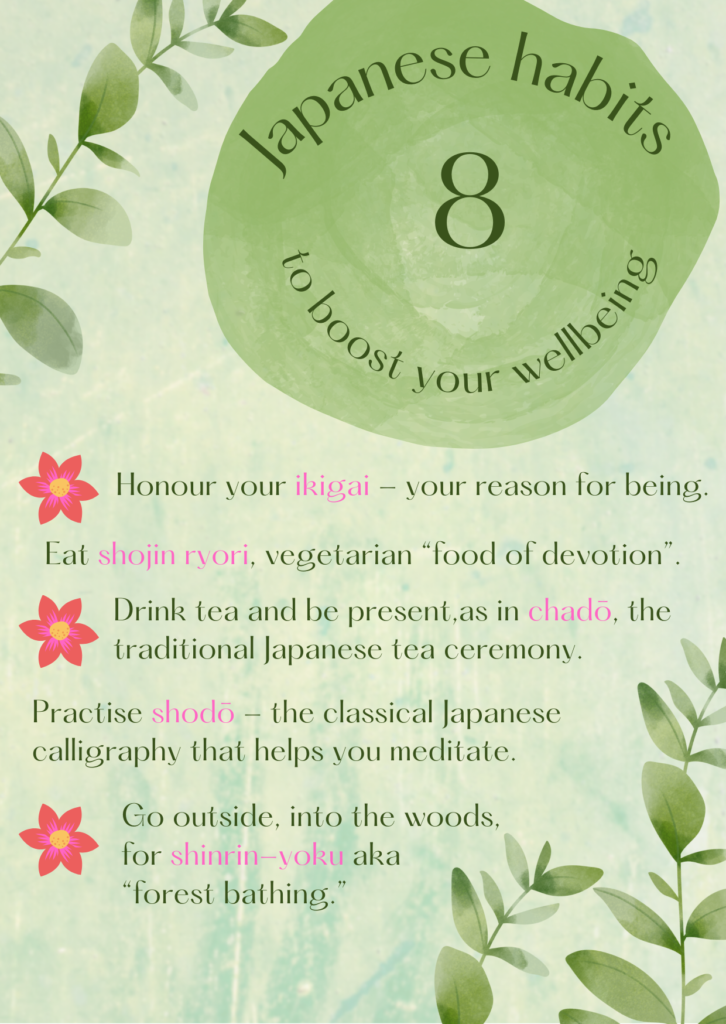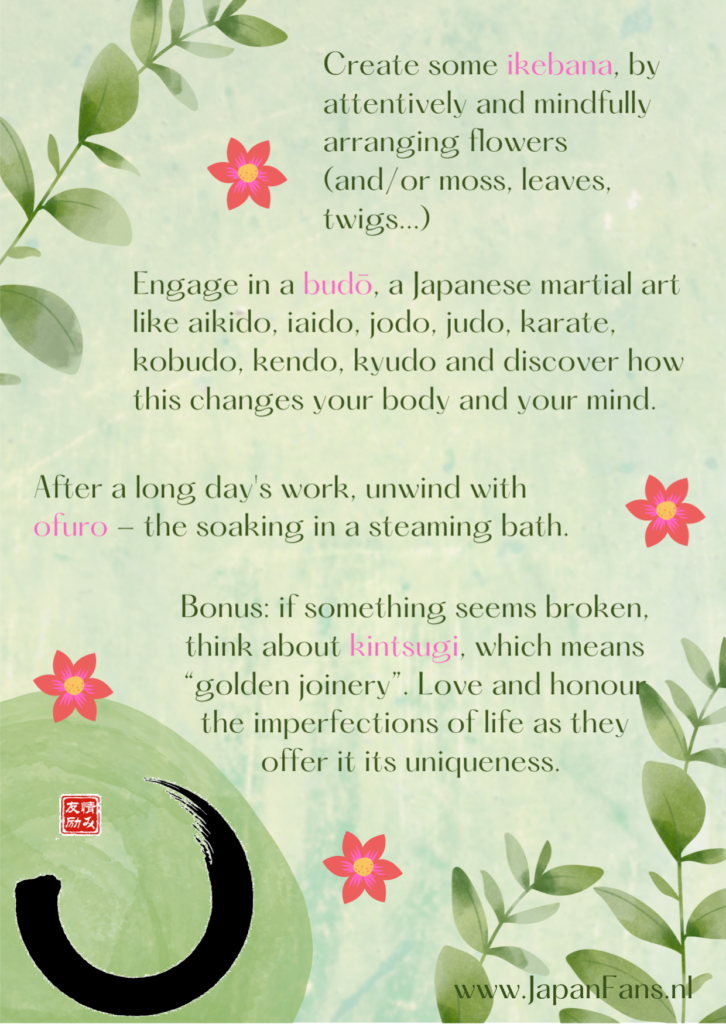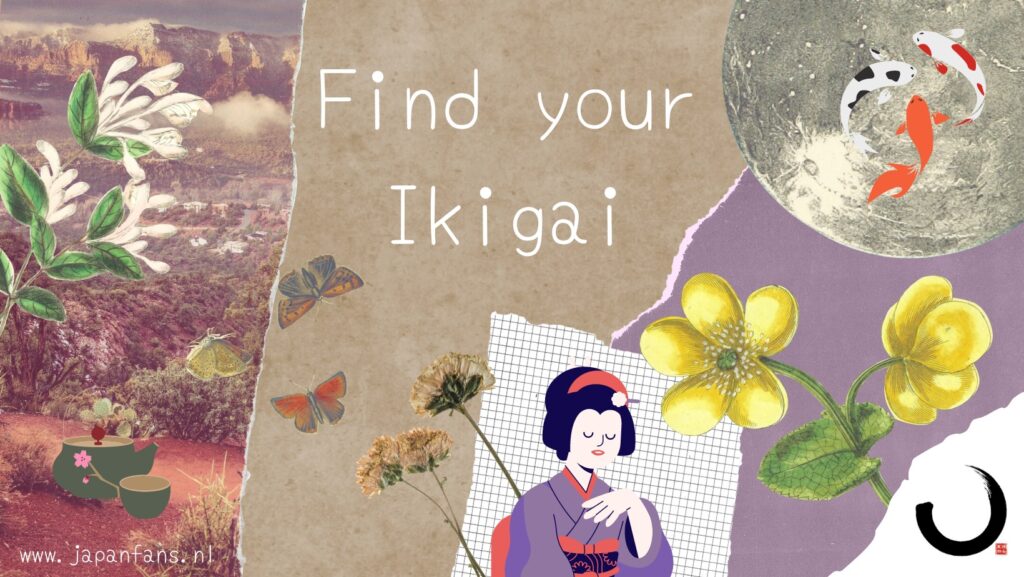The first of our “Eight Japanese habits to boost your wellbeing” is find your Ikigai. Your what?! Don’t worry, in this blogpost, Japan Fan Obanijesu Samuel from Nigeria explains the concept of Ikigai.


The term Ikigai combines the words “Iki” and “gai” which means “Alive or life” and “Benefit or worth” respectively. When these two are combined, they signify the concept of ikigai as “something which gives your life meaning and worth.”
This idea of Ikigai holds that a person’s physical wellbeing is a result of one’s emotional and mental health relationship and having a sense of purpose and meaning in life. This Ikigai concept evolved from the study of the health and wellness theory of conventional Japanese medicine.
Ikigai is believed to be a sense of fulfillment that arises from devotion to carrying out activities that a person enjoys. The state of wellbeing of an individual and the path to life fulfillment is Ikigai. Practicing Ikigai means knowing your life purpose, life mission and unleashing your full potential. The idea is to identify what you are good at, how you can contribute positively to your environment, and fulfillment derived from doing what you love.

The Components of Ikigai
There are four components in the concept of Ikigai, to be kept in mind and answered to determine your Ikigai. If you can figure out what these components are, you’ll have a better idea of where to go next in your search. Your Ikigai should consist of the following:
⦁ What do you love doing?
Pay attention to the things that make you happy, the ones that you would do without hesitation at any time. Your Ikigai is what you enjoy doing. It’s the kind of thing that, if given the opportunity, you’ll jump at the chance to talk about or share with anyone else. Making films, playing a musical instrument, writing, dancing, shooting photos, or even baking are all examples of Ikigai.
⦁ What are you good at?
Finding out what you’re good at is another component to consider when determining your Ikigai. Something you can do with no or little effort? That field in which you’re regarded as an expert? Something you’re naturally good at? This thing could be a skill that you’ve learned and spent a lot of time honing. Fashion design, public speaking, programming, counseling, and marketing are examples. Identifying your skills brings you one step closer to discovering your Ikigai.
⦁ What can you get paid for?
The third factor to consider when looking for your Ikigai is what you can perform and get paid for. To survive and satisfy our everyday expenses and demands, we require money. As a result, your Ikigai should be something for which you are compensated. It is not enough to enjoy what you do and to be outstanding at it; you must also be adequately compensated for your efforts, which will enable you to meet your fundamental necessities.
⦁ What does the world need from you?
The final step in determining your Ikigai is to identify something that the world or a community lacks that you possess. Knowing that we can have a positive impact on the world and make it a better place for everyone makes us feel amazing. This makes us feel that we have an important function to play in our immediate surroundings. If you don’t recognize the worth of what you do, it won’t bring you joy. Knowing that what you do has an impact on other people’s life can assist you in identifying your Ikigai.

Identifying your Ikigai
After you’ve figured out what it takes to find your Ikigai, the next step is to figure out what these four components are in your life. Knowing what you enjoy, what you are excellent at, what you can get compensated for, and what the world needs make it easy to identify your Ikigai.
⦁ You’ve discovered your passion if you have something you genuinely enjoy and excel at.
⦁ If you have a passion for something that the world requires, you are a person on a mission.
⦁ You have your profession if you are one of the numerous people who have something they are exceptional at and get paid for it.
⦁ You have discovered your vocation if you have that thing the world needs and are compensated for it.
Conclusions
Living a purposeful life every day is the key to a long and happy life. The first step toward living a life with meaning is to reclaim control of your future, and the Japanese idea of Ikigai is an excellent tool for doing so. It could take years, if not decades, to figure out what you’re here for.
Keep calm and carry on, since you owe it to yourself. Seize the moment and go after it with everything you have. Finding your Ikigai is an eye-opening experience that is well worth the hassle.

Obanijesu Samuel is a freelance writer, who is passionate about making a positive difference in people’s lives and the world.
Read more about Ikigai:
Inside 6Q
Savvy Tokyo
Sloww.co
